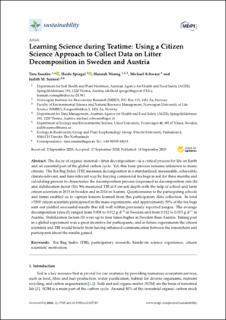| dc.contributor.author | Sandén, Taru | |
| dc.contributor.author | Spiegel, Heide | |
| dc.contributor.author | Wenng, Hannah Tabea | |
| dc.contributor.author | Schwarz, Michael | |
| dc.contributor.author | Sarneel, Judith M. | |
| dc.date.accessioned | 2021-02-01T15:18:41Z | |
| dc.date.available | 2021-02-01T15:18:41Z | |
| dc.date.created | 2020-10-09T18:23:13Z | |
| dc.date.issued | 2020-09-18 | |
| dc.identifier.citation | Sustainability. 2020, 12 (18), 1-14. | en_US |
| dc.identifier.issn | 2071-1050 | |
| dc.identifier.uri | https://hdl.handle.net/11250/2725658 | |
| dc.description.abstract | The decay of organic material—litter decomposition—is a critical process for life on Earth and an essential part of the global carbon cycle. Yet, this basic process remains unknown to many citizens. The Tea Bag Index (TBI) measures decomposition in a standardized, measurable, achievable, climate-relevant, and time-relevant way by burying commercial tea bags in soil for three months and calculating proxies to characterize the decomposition process (expressed as decomposition rate (k) and stabilization factor (S)). We measured TBI at 8 cm soil depth with the help of school and farm citizen scientists in 2015 in Sweden and in 2016 in Austria. Questionnaires to the participating schools and farms enabled us to capture lessons learned from this participatory data collection. In total >5500 citizen scientists participated in the mass experiments, and approximately 50% of the tea bags sent out yielded successful results that fell well within previously reported ranges. The average decomposition rates (k) ranged from 0.008 to 0.012 g d−1 in Sweden and from 0.012 to 0.015 g d−1 in Austria. Stabilization factors (S) were up to four times higher in Sweden than Austria. Taking part in a global experiment was a great incentive for participants, and in future experiments the citizen scientists and TBI would benefit from having enhanced communication between the researchers and participants about the results gained. | en_US |
| dc.language.iso | eng | en_US |
| dc.rights | Navngivelse 4.0 Internasjonal | * |
| dc.rights.uri | http://creativecommons.org/licenses/by/4.0/deed.no | * |
| dc.title | Learning science during teatime: Using a citizen science approach to collect data on litter decomposition in Sweden and Austria | en_US |
| dc.type | Peer reviewed | en_US |
| dc.type | Journal article | en_US |
| dc.description.version | publishedVersion | en_US |
| dc.rights.holder | © 2020 by the authors | en_US |
| dc.source.pagenumber | 1-14 | en_US |
| dc.source.volume | 12 | en_US |
| dc.source.journal | Sustainability | en_US |
| dc.source.issue | 18 | en_US |
| dc.identifier.doi | 10.3390/su12187745 | |
| dc.identifier.cristin | 1838567 | |
| dc.source.articlenumber | 7745 | en_US |
| cristin.ispublished | true | |
| cristin.fulltext | original | |
| cristin.qualitycode | 1 | |

